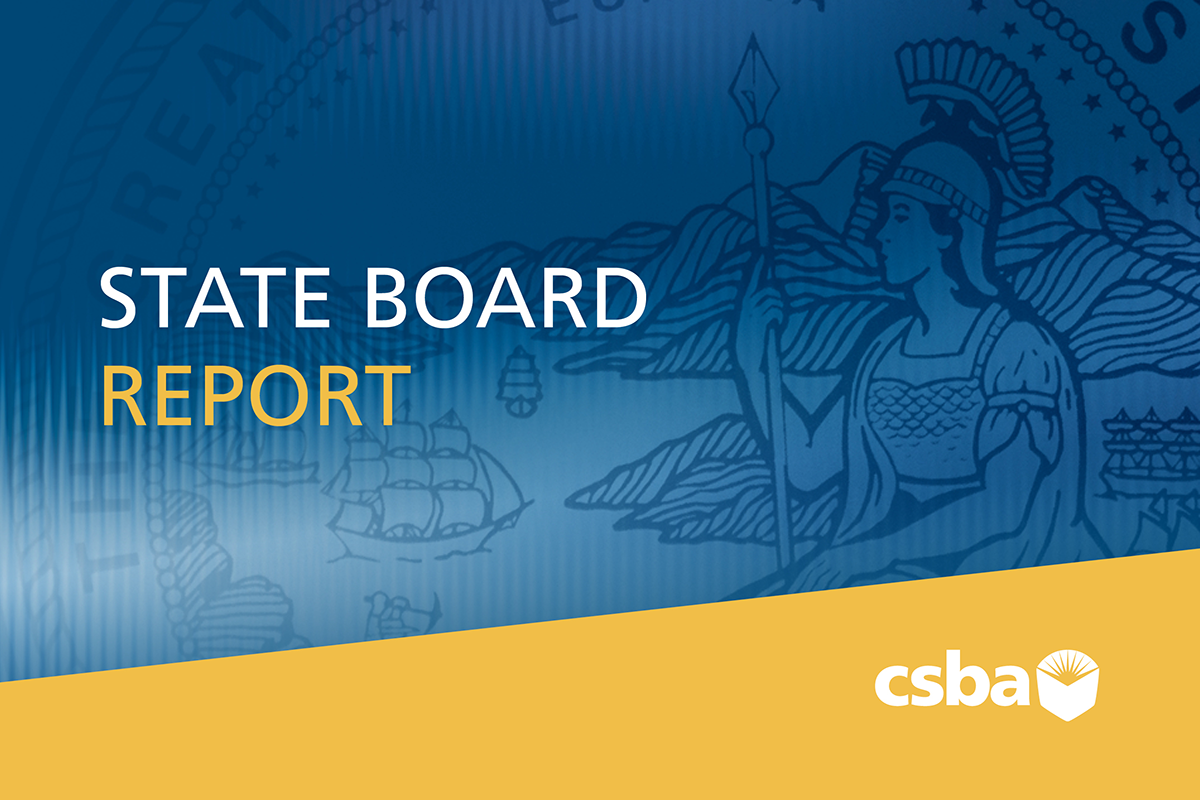During a jampacked meeting of the California State Board of Education (SBE) on March 6, the board reviewed the 2024 Accountability Workplan, approved a revised document providing guidance for reviewing and piloting instructional materials, and more.
Dashboard and accountability
The board reviewed the 2023 California School Dashboard release and provided California Department of Education staff guidance on the proposed 2024 Accountability Workplan, which reflects significant timeline and workload changes to accommodate the new requirement for the public release of the Dashboard by Dec. 1, 2024, pursuant to Senate Bill 114.
The 2024 Accountability Workplan includes incorporation of the Science Assessment results into the Dashboard; the addition of transitional kindergarteners (TK) and long-term English learners (LTELs) as new student populations; a College/Career Indicator (CCI); student-level growth model data; Priority 1: State level data; and an update of the differentiated assistance criteria and designations required under SB 114.
Pursuant to the legislation enacted in 2023, LTELs are defined as pupils who have not attained English language proficiency within seven years of initial classification as an English learner. TK and LTEL student populations will be incorporated into the Dashboard in different ways: TK as a newly distinct population within California’s student-level data collection, and LTELs as a new student group added to all six state indicators.
“Adding the LTEL student group I think allows for us to have even more detail on how our students are doing,” said SBE Vice President Cynthia Glover Woods. “We have 14 student groups. I know on the surface [that] might sound like a lot, but if we’re about all students being successful, we have to be able to look at our students as a whole and also individually.”
SB 114 also requires that any school district eligible for differentiated assistance be provided technical assistance for a minimum of two years following identification based on the results on the Dashboard. County superintendents are required under the bill to provide technical assistance focused on the school district’s data management processes for all school districts who fail to meet the requirements of the collection of student-level data in the California Longitudinal Pupil Achievement System (CALPADS) and build the school district’s capacity to develop and implement actions and services responsive to pupil and community needs.
Feedback from the California Practitioners Advisory Group on the proposed workplan expressed concern over how these changes in metrics and student groups would impact identification for differentiated assistance. SBE President Linda Darling-Hammond noted the need for further board discussion on this and more.
“The thirst for data that is reflected in the work that we’re doing now in expanding the Dashboard is an important one — looking at science, looking at our TK learners and our LTELs,” she said. “Every piece of data that we add might not necessarily be appropriate for differentiated assistance consideration, for accountability, for LCAP — we’ve heard a lot about how those systems are beginning to fall under their own weight, so I just want to flag that as we think about all the data that we want and need to attend to and understand the needs of our students.”
Instructional materials
Last updated in 2015, the “Guidance for Local Instructional Materials Adoptions” — retitled from “Guidelines for Piloting Textbooks and Instructional Materials” — provides local educational agencies direction as they make vital decisions regarding the review and selection of instructional materials. Such guidance is of particular importance when LEAs consider instructional materials in subjects or grade levels where no recent state-level adoption has occurred.
Proposed revisions to the 2023–24 guidance document adopted by the board maintain essential guidance and references to legislation while including modifications such as:
- Added guidance that reflects current practices in evaluating, piloting and selecting standards-aligned instructional materials, including additional emphasis on materials that support multilingual students and students with disabilities;
- Deleting dead hyperlinks and including links to additional relevant resources;
- References to toolkits the California County Superintendents developed for various content areas; and
- Including tools throughout to facilitate decision making during the review process, with full, customizable versions included in an appendix.
Regular updates to this guidance are critical as legislation such as Assembly Bill 1078 — signed by Gov. Gavin Newsom on Sept. 25, 2023 — make changes to the legal responsibilities of local governing boards with regard to instructional materials.
Instructional materials are central to students’ educational success, and governing boards play a vital role in adopting materials that best meet the needs of students in their local communities. In support of this important work, CSBA developed resources (available here) to help trustees better understand the process of instructional material development and adoption, provide an explanation of the difference between standards and frameworks, detail the latest updates — such as changes included in the updated Mathematics Framework adopted in 2023 and new requirements under AB 1078 — and more.
In other State Board meeting news:
- Ahead of Adult Education Week, March 18–22, the board approved the “Unified Strategic Workforce Development Plan 2024–2027” for submission to the U.S. departments of labor and education. Required under the federal 2014 Workforce Innovation and Opportunity Act, the plan outlines core programs operated by the CDE, the Employment Development Department and the Department of Rehabilitation that support reading, writing, math, English language acquisition, vocational skills and more for adult learners.
- The board received an update from CDE staff on the feasibility of implementing a small subset of standardized questions related to students’ sense of safety and school connectedness to school climate surveys as part of the Local Indicator Self-Reflection Tool for Priority 6: School Climate for reporting on the Dashboard.
- The board approved amended regulations to adjust the state testing window for the California Assessment of Student Performance and Progress (CAASPP) so that all tests can be scored and reported by Oct. 15 each year, as now required by California Education Code (EC) Section 60641.
- Commencement of a 45-day public comment period was approved for proposed amendments to regulations related to the CAASPP and proposed amended regulations regarding the School Nutrition Programs to align various California Code of Regulations with a number of current EC sections.
- The board approved the remaining 2023–24 Local Educational Agency Comprehensive Support and Improvement Plans.
The next State Board meeting is scheduled for May 8–9, 2024. View the full meeting calendar.



